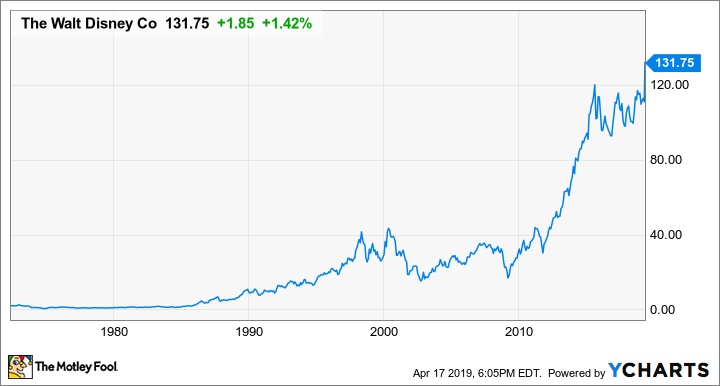3 Stocks the World's Best Investors Are Buying Right Now
Many investors keep an eye on the portfolio additions and subtractions that billionaire hedge fund managers make. Sometimes those movements can give investors ideas of current or future trends, and it also enables investors to mimic popular moves while avoiding hedge fund fees. Whatever your reason may be for keeping an eye on hedge fund moves, three Motley Fool contributors noticed managers have been buying The Walt Disney Company (NYSE: DIS), Facebook (NASDAQ: FB), and JPMorgan Chase (NYSE: JPM).
Disney's new era
Daniel Miller (The Walt Disney Company): During the fourth quarter of 2018, eight more hedge funds added shares of The Walt Disney Company to their portfolios. Now 71 hedge funds control roughly $3.41 billion value of Disney, making it one of the top 30 most popular stocks owned by hedge funds. While "smart money" appears to love Disney, it comes at a period when the stock has recently hit an all-time high!
The question facing investors is simple: Is Disney still worth buying as it trades near all-time highs? While that's not an easy question to answer, the company recently provided investors a reason to believe it has a bright future. Ironically, that could be because Disney is busy disrupting itself. Disney announced that its widely anticipated and much-hyped video streaming service, Disney+, will roll out in the U.S. on Nov. 12, 2019, with a price tag of only $6.99 per month.
Disney+ will be quite a bit cheaper than the $13 Netflix charges for its most popular streaming plan, and it emphasizes how determined Disney is to get its foot in the door in the competitive streaming market. The subscription service will boast content from Disney, Pixar, Marvel Studios, the Star Wars franchise, and Disney's acquisition of Fox. In total, the service will have more than 7,500 television episodes and 500 films.
Disney isn't stopping there, either, with plans to add 25 original series, 10 original films, documentaries, and specials. In fact, Disney is going to spend roughly $2 billion per year to accelerate its content development by 2024, and it hopes the wealth of content will lure between 60 and 90 million subscribers within five years.

Image source: Getty Images.
Disney as a whole is so much more than its new streaming service, no doubt. But for long-term investors and for many bright hedge fund managers, the fact that Disney is busy disrupting its traditional business with its new streaming service is a great sign of a company ready to adapt and thrive for many more decades.
A tech giant coming out of the woods
Jeremy Bowman (Facebook): There's no question that 2018 was a dismal year for Facebook. Shares of the social networking giant fell 26% as it was hit by a parade of scandals, including its role in Cambridge Analytica's influencing of the 2016 election and revelations that it paid for opposition research against its detractors, a tactic usually reserved for nasty political campaigns.
Amid rising privacy concerns, CEO Mark Zuckerberg was trotted before Congress a year ago to defend the company's practices, and Facebook the product fell out of favor with many in the chattering classes.
However, 2019 is a new year, and Facebook seems to be back on the right track. The stock has recouped last year's losses, rising 35%, and many of the world's top investors took notice of the sell-off late last year. According to CNBC, 15 of the world's 50 largest hedge funds owned the company at the end of the fourth quarter, up from just 6 at the end of the third quarter.
Among those that bought the stock was Viking Global, led by Ole Andreas Halvorsen with $28.8 billion under management. Those purchases turned out to be prescient after Facebook's rise this year following a better-than-expected fourth-quarter earnings report. Given Facebook's attention to privacy and Zuckerberg's renewed commitment to protecting user data, the company seems to be doing the right thing to repair its image, though some critics remain skeptical.
While the stock isn't the bargain it was a few months ago, Facebook shares still seem like a good deal today, trading at a modest P/E of just 23. The company has warned that profit growth will slow this year as it invests in safety and cybersecurity, but with the outcry against it having peaked, the long-term picture looks promising.
A bank the best bank investor is buying
Jordan Wathen (JPMorgan Chase): It's worth paying attention to anything that Warren Buffett is buying or selling for Berkshire Hathaway, and when Buffett's buying banks, you should really pay attention.
Buffett's recent investments in JPMorgan Chase have caught my eye for two reasons. First, Berkshire has outsize exposure to the banking industry already, so to add to his bank bets suggests he sees enough value to compensate for concentrating his investments in one sector. Second, JPMorgan is a very new addition to the portfolio, but the position is already large enough that it seems likely to be a stake Berkshire finds worthy of holding "forever."
As Buffett pointed out in a recent interview, JPMorgan Chase reliably earns returns in excess of the banking industry average, earning an annualized return on tangible equity of 19% in the most-recent quarter. Though that performance won't be duplicated in perpetuity -- low loan losses are never a permanent fixture for any bank -- it's notable that the bank is earning stellar returns in an interest rate environment that is far from ideal (short-term rates have increased faster than long-term rates).
In a competitive industry, JPMorgan's high returns can be attributed to its scale and ability to underwrite and manage risk. The bank benefits from being the largest in the country by assets, spreading its expenses across a bigger balance sheet. Its credit performance is stellar, given the bank remained profitable even in the depths of the financial crisis. Last year, it charged off just 0.52% of loans, the lowest net charge-off ratio since the financial crisis.
JPMorgan is not the kind of stock that will double overnight, or even over the next year, but it's a great bank stock to buy, hold, and otherwise forget about.
More From The Motley Fool
Randi Zuckerberg, a former director of market development and spokeswoman for Facebook and sister to its CEO, Mark Zuckerberg, is a member of The Motley Fool's board of directors. Daniel Miller has no position in any of the stocks mentioned. Jeremy Bowman owns shares of Facebook and Walt Disney. Jordan Wathen has no position in any of the stocks mentioned. The Motley Fool owns shares of and recommends Berkshire Hathaway (B shares), Facebook, and Walt Disney. The Motley Fool has a disclosure policy.

 Yahoo Finance
Yahoo Finance 
